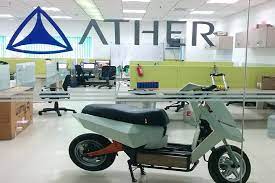
The leading electric scooter manufacturer of India by revenue, Ather Energy, is soliciting funding to increase its annual production capacity to one million scooters over the next three years as the company reacts to increasing demand, said reports.
Since its creation in 2013, Ather has raised roughly 12 billion rupees ($160 million) and is in the midst of raising more, according to Tarun Mehta, CEO of Tiger Global and Indian motorcycle manufacturer Hero MotoCorp.
"Our plan was to not raise more capital and focus on growing the brand, but the rate of transition to electric and the pace at which the supply chain and capacities need to ramp is way faster than what we thought a year back," Mehta said in an interview to the media.
He wouldn't say how much the company is planning to raise. According to a source familiar with the arrangements, Ather is seeking $133 million. Hero has already contributed $56 million to the fund.
Last year, sales of electric scooters in India increased by more than fivefold, as high fuel prices prompted purchasers to explore for alternatives, while government incentives helped to close the price gap between electric and gasoline versions.
Despite this, electric motorcycles and scooters accounted for only 1 per cent of overall motorcycle and scooter sales in India, which totaled 14.5 million in 2021. As part of its efforts to lower its oil import cost and minimize pollution, the government expects this to reach 40 per cent by 2030.
Ather is also beefing up its cash reserves in the face of increasing competition from startups like Softbank Group-backed Ola Electric, which recently raised $200 million, as well as India's traditional motorcycle manufacturers, such as Hero, Bajaj Auto, and TVS, which are accelerating their clean mobility plans.
By the end of 2022, Ather wants to boost its yearly production capacity from 400,000 to one million scooters, install 5,000 fast chargers across India, develop new models, and expand its network to 600 stores, according to Mehta.
The most significant difficulty, he believes, is expanding the supply chain and persuading suppliers to invest in electronic components such as motors and controllers ahead of schedule for India's nascent electric car market.
Ather's profitability will be delayed by the required investment and expansion rate, which Mehta estimates will take another two years.
"The demand is massive, and the Indian market has been supply constrained," he said.
Ather produces 5,000 electric scooters per month and makes its own lithium-ion battery pack. In 2022, Mehta plans to increase production to 20,000 scooters per month, thanks to a boom in demand from smaller cities.
His long-term goal is to invest in companies that help people use more sustainable energy.
"The next thing that excites me is trucks and buses - it is low volume but massive energy consumption," he said.
(Source:www.ndtv.com)
Since its creation in 2013, Ather has raised roughly 12 billion rupees ($160 million) and is in the midst of raising more, according to Tarun Mehta, CEO of Tiger Global and Indian motorcycle manufacturer Hero MotoCorp.
"Our plan was to not raise more capital and focus on growing the brand, but the rate of transition to electric and the pace at which the supply chain and capacities need to ramp is way faster than what we thought a year back," Mehta said in an interview to the media.
He wouldn't say how much the company is planning to raise. According to a source familiar with the arrangements, Ather is seeking $133 million. Hero has already contributed $56 million to the fund.
Last year, sales of electric scooters in India increased by more than fivefold, as high fuel prices prompted purchasers to explore for alternatives, while government incentives helped to close the price gap between electric and gasoline versions.
Despite this, electric motorcycles and scooters accounted for only 1 per cent of overall motorcycle and scooter sales in India, which totaled 14.5 million in 2021. As part of its efforts to lower its oil import cost and minimize pollution, the government expects this to reach 40 per cent by 2030.
Ather is also beefing up its cash reserves in the face of increasing competition from startups like Softbank Group-backed Ola Electric, which recently raised $200 million, as well as India's traditional motorcycle manufacturers, such as Hero, Bajaj Auto, and TVS, which are accelerating their clean mobility plans.
By the end of 2022, Ather wants to boost its yearly production capacity from 400,000 to one million scooters, install 5,000 fast chargers across India, develop new models, and expand its network to 600 stores, according to Mehta.
The most significant difficulty, he believes, is expanding the supply chain and persuading suppliers to invest in electronic components such as motors and controllers ahead of schedule for India's nascent electric car market.
Ather's profitability will be delayed by the required investment and expansion rate, which Mehta estimates will take another two years.
"The demand is massive, and the Indian market has been supply constrained," he said.
Ather produces 5,000 electric scooters per month and makes its own lithium-ion battery pack. In 2022, Mehta plans to increase production to 20,000 scooters per month, thanks to a boom in demand from smaller cities.
His long-term goal is to invest in companies that help people use more sustainable energy.
"The next thing that excites me is trucks and buses - it is low volume but massive energy consumption," he said.
(Source:www.ndtv.com)





